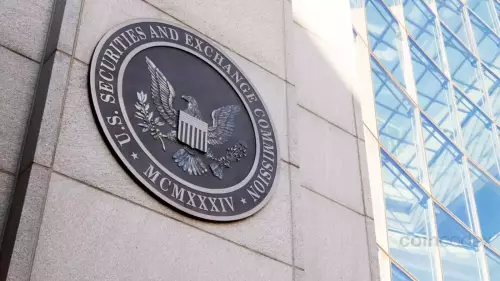 |
|
 |
|
 |
|
 |
|
 |
|
 |
|
 |
|
 |
|
 |
|
 |
|
 |
|
 |
|
 |
|
 |
|
 |
|
Cryptocurrency News Articles
Internet, Human Proof, and Survival: Navigating the AI Frontier
Sep 22, 2025 at 08:00 am
As AI evolves, proving human identity online becomes critical. Discover insights on 'Internet, human proof, survival' and the tech shaping our digital future.

In an era where bots and AI-generated content are increasingly prevalent, the concept of proving one's humanity online has moved from science fiction to a pressing necessity. Let's dive into the dynamics of 'Internet, human proof, survival'.
The Rise of Proof of Humanity
The surge in AI capabilities has blurred the lines between human and machine, creating challenges across various online platforms. From social media to e-commerce, distinguishing humans from bots is crucial for maintaining fairness, security, and trust.
World ID: A Potential Solution
World ID, a proof-of-human protocol, is emerging as a key player in this space. With over 16 million verified humans and a growing network of Orbs across the globe, it offers a scalable and privacy-focused approach to verifying identity. The technology relies on Anonymized Multi-Party Computation (AMPC) to ensure user data remains secure and private.
Why Proof of Humanity Matters
The necessity for proof of humanity extends beyond just preventing bots from spamming social media. It addresses fundamental issues of fairness and resource allocation. As Adrian, Chief Architect and CISO at Tools for Humanity, points out, bots exploit systems, drain resources, and undermine trust. Proof of humanity is essential for ensuring equitable access and preventing abuse.
The Role of WLD and Corporate Adoption
The WLD token is designed to incentivize adoption and sustain the World ID network. It aims to distribute ownership and create a fee model for companies integrating proof of humanity into their services. While the token's volatility has raised concerns, supporters argue it is a necessary mechanism for bootstrapping the network and ensuring its long-term viability. Companies like Eightco and BitMine have invested heavily, signaling confidence in the technology's potential.
Asia's Leading Role
Asia is at the forefront of proof-of-humanity adoption. Countries like Japan, Singapore, and South Korea have seen rapid growth in World ID verifications. Thailand is actively using World ID to combat online fraud, highlighting its practical applications in addressing real-world challenges. This regional momentum underscores the global relevance of proof of humanity in an increasingly digital world.
Challenges and Future Outlook
Despite the progress, challenges remain. Regulatory scrutiny, token economics, and the need for broader adoption are key hurdles. The question is whether proof of personhood can evolve into a global public utility, as essential as electricity or clean water, or whether regulatory friction and token economics will limit its reach.
A New Era of Trust
Proof of humanity represents a fundamental shift in how we interact online. It's about reclaiming trust and ensuring that the digital future remains human-centric. While the path forward may be uncertain, the need for solutions that can distinguish humans from bots is undeniable. As the internet evolves, proof of humanity could become the cornerstone of a new trust layer.
So, next time you're battling a barrage of bots or wondering if that online deal is too good to be true, remember that the quest for proving our humanity online is just getting started. Who knows, maybe one day we'll all have to flash our digital badges to prove we're not robots at the coffee shop. Until then, stay human, my friends!
Disclaimer:info@kdj.com
The information provided is not trading advice. kdj.com does not assume any responsibility for any investments made based on the information provided in this article. Cryptocurrencies are highly volatile and it is highly recommended that you invest with caution after thorough research!
If you believe that the content used on this website infringes your copyright, please contact us immediately (info@kdj.com) and we will delete it promptly.






























































